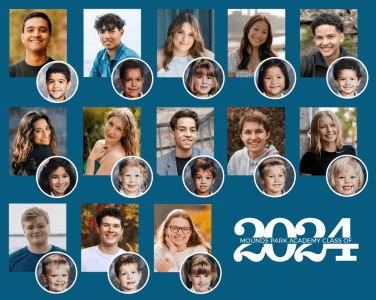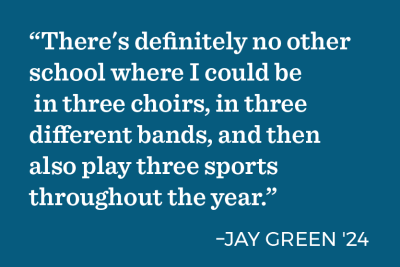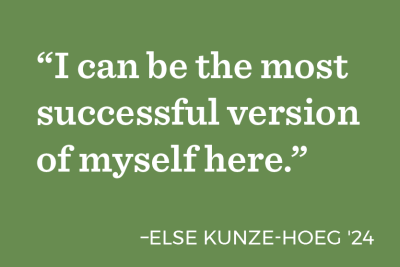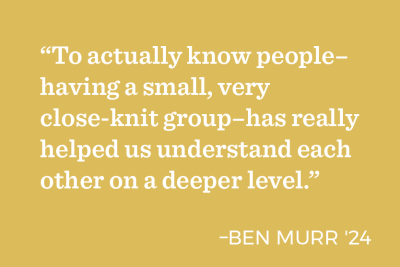May 20, 2024
 Near the end of their final year at MPA, we had the honor of interviewing many of the MPA Class of 2024 Lifers about their time at MPA, the only school they’ve been at for their entire academic career. A group of dedicated athletes, talented musical artists, Peer Leaders, and proud self-proclaimed robotics “nerds,” each of them shared memories and reflections of MPA past and present, looking toward the future well prepared by MPA. Devneet Biring, Jay Green, Greta Hanson, Sylvia Hawley, Micah Hudock, Khushi Jain, Else Kunze-Hoeg, Logan Miller, Ben Murr, Nora Pederson, Hunter Scheible, David Steinberger, and Molly Vergin will graduate on June 8 and join MPA’s Joanne Olson Club, reserved for students whose entire K-12 or PreK-12 journey has taken place here at MPA.
Near the end of their final year at MPA, we had the honor of interviewing many of the MPA Class of 2024 Lifers about their time at MPA, the only school they’ve been at for their entire academic career. A group of dedicated athletes, talented musical artists, Peer Leaders, and proud self-proclaimed robotics “nerds,” each of them shared memories and reflections of MPA past and present, looking toward the future well prepared by MPA. Devneet Biring, Jay Green, Greta Hanson, Sylvia Hawley, Micah Hudock, Khushi Jain, Else Kunze-Hoeg, Logan Miller, Ben Murr, Nora Pederson, Hunter Scheible, David Steinberger, and Molly Vergin will graduate on June 8 and join MPA’s Joanne Olson Club, reserved for students whose entire K-12 or PreK-12 journey has taken place here at MPA.
Choosing a school for 13 years means you’re growing up within a strong community that ensures every child here is known. So we asked: How has MPA’s community supported and shaped you over the years?
Jay: Everything I do pretty much revolves around sports, so what’s been really helpful for me is the community. If I’m in the hallway and I see a parent or a teacher, they always ask me how my game was, and that’s something that I really have enjoyed in my time here because it makes me feel seen. That was very consistent from even when I was in kindergarten, just playing in gym class versus now, when I play three sports at a time. That’s something that’s shaped me into a better person. I think now my focus is trying to give that same opportunity to the younger kids that I see and am coaching. I think the community does a very good job of supporting everyone in it. From my perspective, I feel like I’ve been very well-supported by pretty much everyone around me.
Khushi: I agree with that. Being both a tennis athlete and a nerd in robotics has pushed me to do more of what I love. Through tennis, I’ve learned more about myself, about mental health, and other things. Through robotics, I’ve learned how to be a leader, how to speak up, and how to get the team together. Through all these different clubs and activities that MPA has, I’ve learned different skills from each.
Micah: There are a lot of people who have a lot of different interests in a lot of areas. Everyone’s kind of encouraged to do their own thing and have their own interests, and no one is trying to fit into a category. Everyone’s cool to do whatever they want.
Ben: Elaborating on that, I’ve really enjoyed being able to know my class. To actually know people—having a small, very close-knit group—has really helped us understand each other on a deeper level than just, “There’s a person from my class in the hallway.” I find that nice.
 Nora: I like how integrated everybody is, whether in sports or other things. For example, in basketball, we did this kid’s camp with the boys’ and girls’ teams where we got to work with Lower and Middle School students, so now when I see them in the hallway I can say hi. And with different classes like choir and orchestra, you get to know people in all grades. With track, since it’s a co-ed sport, I get to talk and know people that I wouldn’t normally. It’s just interesting knowing more than one grade.
Nora: I like how integrated everybody is, whether in sports or other things. For example, in basketball, we did this kid’s camp with the boys’ and girls’ teams where we got to work with Lower and Middle School students, so now when I see them in the hallway I can say hi. And with different classes like choir and orchestra, you get to know people in all grades. With track, since it’s a co-ed sport, I get to talk and know people that I wouldn’t normally. It’s just interesting knowing more than one grade.
Sylvia: The relationships we’re able to build are pretty unique to this school because of the small class sizes. Throughout all my years here, I think all the teachers really make an effort to build a relationship outside of the classroom, to know you on a more personal level. That has allowed me to feel comfortable sharing non-class material with them and getting to know them as people. I think that has shaped my love for learning but also made me want to do more.
MPA students are involved and engaged in their own education. In an environment of open discourse and academic rigor, they find a balance of academics, arts, and athletics. So we asked: How has MPA prepared you for both academic and future professional success, balanced with a meaningful life?
Jay: MPA at every level—in Lower School with the CHAMP program, and then in Middle School—our teachers started to challenge us to be leaders within our grades. Now, almost all of us here are captains of a team or club leaders. I felt like that has prepared all of us in a really big way, just being leaders in our own ways. I think being a leader is great, but knowing how to lead in different ways is also huge because you have to adapt to the people you’re leading. That definitely prepared me for going to Macalester next year. I already have a sense of the way that some of my new teammates and friends respond to leadership. That’s going to help all of us as we grow older because if you have just natural leadership qualities, you’re going to be well-suited for wherever you are. In my everyday life, when my sisters look to me for advice, I feel like I’m more suited to give them advice now versus maybe two or three years ago. That’s because MPA has done a very good job of building leadership characteristics as we’ve grown older.
Else: One of the best aspects of MPA is that it’s so tight-knit. And MPA, being a college prep school, gives you the opportunity to have a one-on-one connection with your teacher and be able to ask questions. And I think that’s one of the most important life skills we learn at MPA. Going into college, your class size will grow exponentially and it becomes hard to form those bonds, but with the practice that we have at MPA, 13 or 14 years, that helps us form our future in college and beyond. I think one of the most special things is being able to experience it, not only yourself but also seeing your peers do it. Seeing someone else ask questions helps you gain more confidence to ask them.
Nora: This is also academically related—MPA is a hard school academically, but it obviously prepares you very well for college, being a college prep school. It taught me how I should manage my social life, how much time I should be putting into homework, and how to balance that. In college, I heard you have a lot more free time than in high school. I think it’s very beneficial that we’ve already learned how to balance in high school so that we can carry that into college and after.
David: I think MPA really helps with the language aspect. It’s one thing to be a leader in your own way, and it’s another thing to know what to say. And I think MPA really builds off language, especially in the writing and speaking departments, because we practice it so much and because the teachers just do such a great job with that. A lot of the kids that come out of MPA are well-spoken and end up being better writers and speakers because of that experience in English classes.
Micah: It does work on your time management and being able to manage your time wisely. For most people who are in sports, there are times where you have practice that goes from this time to this time, and then you have also a rigorous academic schedule as well. MPA teaches you how to work hard for what you really want.
Sylvia: Especially in high school, the teachers and the community have really prepared me well to advocate for myself in a classroom setting. Just as teachers encourage us to ask those questions and ask about what grade we got or why we got it. And I think that encouragement has really helped and will serve me very well in college with the bigger class sizes.
The MPA experience is unique to every child, a cornerstone of differentiation and individualized attention that happens in classrooms here, PreK-12. To express themselves and reflect on their Lifer journey, we asked: What are the benefits of being a Lifer at MPA? How has that impacted your educational journey?
Ben: The lunches! Around third grade, I was thinking about moving to a different school, and while I did not like their lunches very much (LOL), I noticed that I wasn’t really able to have that community that I built up at MPA. And I felt like losing that community was something that I would never do. So I chose to stay, and looking back, I don’t regret that decision because it’s a great group of people at MPA.
Khushi: I felt really, really comfortable at this school. Throughout my time here, I’ve just always felt like MPA is a nice, safe, complete community. I have teachers I feel comfortable going to for anything. All the relationships and bonds I made throughout the years at this school—the people in the community made me stay.
Jay: When I got to eighth grade, my dad was like, “You have an opportunity to play varsity sports all the way through your high school career (at MPA). You have the opportunity to do pretty much whatever you want musically,” which is when I started to get into my musical aspirations. There’s definitely no other school where I could be in three choirs, in three different bands, and then also play three sports throughout the year. If I went somewhere else, I wouldn’t get to have as much fun as I do during the day. That’s definitely why I stayed. This was the only place that gave me that, and I’m very grateful for that decision.
David: I had a community. And in terms of getting into a good school, I don’t think there’s another school in the area that really compares to MPA for getting into a college. And again, the writing, is really good here.
 Ben: The MPA cross country team is very close and really supportive. Because of the fact that you can join varsity earlier and because we have a no-cut policy, it allows that good camaraderie to exist. And the other thing I liked is the opportunities that at least allowed me to realize that it’s not just sports—there’s robotics, there’s debate, all of these other activities that I wouldn’t have thought of otherwise because I was just looking at sports.
Ben: The MPA cross country team is very close and really supportive. Because of the fact that you can join varsity earlier and because we have a no-cut policy, it allows that good camaraderie to exist. And the other thing I liked is the opportunities that at least allowed me to realize that it’s not just sports—there’s robotics, there’s debate, all of these other activities that I wouldn’t have thought of otherwise because I was just looking at sports.
Else: I can be the most successful version of myself here. Going into seventh grade, we had the best team that went to state for volleyball, and that was really amazing. Not only because I had the opportunity to be a leader on that team as a seventh grader, but Upper Schoolers listened to me when I wanted to say something. Before we left for state, the entire team sat on the court of the Lansing Sports Center and went around talking about specific goals. One of the things that I said was that I am so glad that I have the chance to be on the team and not be babied by the upperclassmen because I think that’s a common thing when you have a younger player on the team. Having that opportunity to step into a role early on in my sports career and early on in my life was just really amazing to me.
Another reason that really solidified my reasoning for being at MPA was the community that we had at the first state game. The entire school was there watching! That was so cool—not just the MPA athletic community but the entire MPA community gathered together at that one time. That was really amazing to me, and it didn’t go away the second time we went. That was really cool.
Nora: I remember my eighth-grade year when I was playing soccer and was not even good, but both Sylvia and I were little eighth graders and got the chance to be on the real JV and varsity teams. All of the varsity soccer players and the seniors were just so nice to us, and it didn’t even feel like there was a barrier between any of the grades. It was just really nice to feel so accepted in such a young grade. You can grow, even if you’re not on the best team. Personally, in basketball, I’ve grown a lot more confident. I’ve grown as a player, being able to play in two different environments because I know what to do in situations that I normally wouldn’t have in a club game. It can just round you as a player. You can really learn how to lead at a young age, no matter how old you are. I’m actually thankful that I stayed here to do athletics.
Jay: My dad told me to be the one to spark change in athletics. I feel almost everybody in this room who has played athletics—that’s kind of what they did. Take the opportunity to take a lead of a team at a young age and be there through every single phase, like when Micah and I played varsity basketball freshman year, we won three games, and then this year and last year, we set the program record in wins and had a very big run in sections. To be able to see that and reflect that I was there for all of it and I was there at the start of the rebuild, was pretty cool. It rounds you as a basketball player, as an athlete. It gives you so many more life skills. There are so many people who try something, and if it doesn’t go well, they give up and I think there’s a lot to say about the people who stay and stick through all that. Those are the ones who, when they’re older, will go farther because they’re used to struggling so that they can see success.
David: One of the things that helped me come out of my shell as an athlete was the personal training class here. In the weight room at other schools, you typically get a culture built around this idea that if you’re not lifting a certain weight, you shouldn’t be in there. I remember when I went into the class in tenth grade, the seniors took me under their wing, and it was a supportive culture. The environment here is a lot different than it is in other schools. We have a supportive community that says, “Let’s see how we can get better.”
MPA values collaboration over competition, which manifests in academics, athletics, and interpersonal relationships. Having a collaborative environment allows exploration without consequences. So we asked: How have you thrived in MPA’s environment of collaboration over competition?
Ben: The debate team is 60 or more people, with a tournament sometimes every weekend, and we have classes for it. What I’ve always noticed, especially because it is a class rather than just an after-school activity, you are always working together, and inevitably going to have to compete with one another at some point. But when you’re in the class, or you’re doing after-school practices, it’s always about how we can make the team better and how we can make better arguments. It’s the fact that all of the research that everyone does together, and people put in hours of research, is all done for the good of the team as a whole. I think that it really emphasizes that MPA works really hard, but does so to help each other.
Jay: For a really long time I struggled to find the balance between competitiveness and being able to collaborate with people in group projects. I’m naturally just very competitive. I always wanted to get the best grade if I could get the best grade. I would just want to win at any cost. I just had a hard time having an off switch, I guess. I think MPA does a really good job of doing group work pretty much every single day. And so, from doing it so many times, I’ve learned how to just work better with people. I’m not focused on getting the best grade anymore, I’m just focused on doing the best job with the people I’m working with.
 Being able to decide when it’s a time to be competitive and when it’s a time to have fun with the group of people that you’re working with is for me, academically, how I flipped the switch. And then I started to see better grades naturally because I was having fun with what I was doing.
Being able to decide when it’s a time to be competitive and when it’s a time to have fun with the group of people that you’re working with is for me, academically, how I flipped the switch. And then I started to see better grades naturally because I was having fun with what I was doing.
Nora: By now, we have all realized that there’s no reason to be competitive with one another. We’re all going to go to the same place. As a class, MPA has helped us do this. One grade won’t make or break you, and everybody collectively can reassure each other about their grades. And you don’t need to be competitive about your grades and compare yourself to other people and how they’re doing, because everybody’s at different points.
Devneet: MPA really builds that sense of trust with one another, especially with group projects. For me, I struggled with being a perfectionist. I hated group projects. I always wanted to be alone, but forcing myself to be in groups and being with different people too really helped me gain back that trust, especially for group projects and just relationships in general. With friends, I started to open up more and be a little bit less independent and more collaborative in my thinking.
We can’t wait to see how the Class of 2024 changes the world and how their experiences at MPA will support them on their next adventures. To end, we asked: In one word, what does it mean to you to be an MPA Lifer?
David: Community.
Hunter: Effort.
Nora: Thinker.
Else: Joyful.
Sylvia: Adaptation
Ben: Dedication.
Devneet: Trust.
Micah: Authentic.
Jay: Balance.
Khushi: Ambitious.
Interested in where the Class of 2024 Lifers are headed next year?
- Devneet Biring will be studying biology at St. Edwards College
- Jay Green will be studying biology at and playing football for Macalaster College
- Greta Hanson will be studying playwriting at the Theatre School at DePaul University
- Sylvia Hawley will be studying political science and government at Boston College
- Micah Hudock will be studying industrial engineering at Northwestern University
- Khushi Jain will be studying biological sciences and neuroscience at the University of Pittsburgh
- Else Kunze-Hoeg will be studying biochemistry at and playing volleyball for Wellesley College
- Ben Murr will be studying physics at and running cross country for Luther College
- Nora Pederson will be playing basketball for Luther College
- Hunter Scheible will be studying biology at the University of St. Thomas
- David Steinberger will be studying biology at and rowing for Skidmore College
- Molly Vergin will be attending St. Olaf College